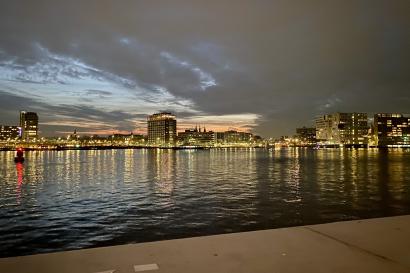
The doors swung close, pinching my backpack between them, and I hoped that the bus driver had noticed. He did, he reopened the doors, and I forced one more step forward into the mass of people standing in front of me. Considering that my morning bus to work arrives every 8 minutes, and that there are multiple buses that share similar routes, I would have thought that the bus (much like the metro) would not be packed with commuters during so many hours of every weekday. After my 45 minute commute I carefully disembark from the bus, making sure that none of the city’s countless motorcyclists or bicyclists are fast approaching between the bus and the pavement. Despite the winter temperatures here, which tend to oscillate in the range from 30ºF to 60ºF, cyclist of various sorts still make up a large percentage of city commuters.
When I arrive to my workplace at the Chilean Ministry of Finance, I pass through the first floor lobby to access the elevators, the only apparent service that the first floor seems to provide, besides access to the building of course. This floor area has only the essentials. The hard and dull colored tile floors have no rugs or design, and there are no decorations or art work hanging on the crème colored walls. The lighting is essential, serving only its most fundamental purpose: providing light so people can safely navigate through the space. There are no ornate chandeliers that serve as both a source of light and decoration. Thankfully, my office on the 11th floor of the building is well lit and a bit warmer and comfortably, although still basically, furnished.
By the time I return home from class in the evening, the temperature has dropped, often around the mid to low 40°s. By this time, the sun has completed its descent behind the snowcapped mountains to the west of Santiago. If we were lucky enough, the thick clouds that often hover over the city in the Santiago winters, have dissipated and the beautiful sunset was visible that evening. Back at home I change directly from my work clothes to a long-sleeved shirt, pants, and socks. Some nights I even leave my hat on after coming indoors. And if I´m lucky, the outdoor temperature will drop below 40º and my host mom (anfitriona) will utilize the electric heater for an hour or two to warm up the apartment a few degrees. (While there is central heating in the apartment, it generally provides only a modest increase in temperature from outside.) Before going to bed I shower, but I keep this process brief and essential as there is no guarantee how long the hot water will last.
I share these experiences not to complain about the norms in Chile to which I have been adapting. It really isn’t that bad. Nor do I share these descriptions to paint a picture of Chile as in anyway inferior to the States simply because some of the standards of comfort to which I am accustomed are harder to come by here.
On the contrary, as someone who is especially environmentally conscious, I have been much more inclined to be frustrated by the often extravagant and wasteful norms in the States, than I am discomforted by the relative lack of excessive luxuries here in Santiago. For instance, on my college campus, I´ve often witnessed students leaving on dorm lights when they leave the room to attend class. In other cases, I witness the stigma we often attach to utilizing public transportation in the states, how we discard it as not a viable option because of either the 5 to 10 minute walk to a bus, or because the lack of having one’s own space for the 20 minute commute is too unbearable. It is small differences like this that I’ve observed in the culture here that lead me to ponder how much we unnecessarily waste as a society in the US.
At the same time I acknowledge that many of the sustainable decisions that people make on the day to day here aren´t necessarily made for the sake of being sustainable. For instance, because the country imports the vast majority of its fossil fuels, excessive heating of buildings is less likely because it is much less economically feasible. In many cases it is the financial circumstances of a people or a society that dictate whether seemingly simple behaviors like leaving the lights on while leaving the house for an hour, leaving the warm water running while brushing ones teeth, or taking a $10 uber versus a 5 minute walk and $2 bus, are decisions that even warrant serious consideration. Nonetheless, it is often our financial circumstances that while enabling us to enjoy more goods and luxuries, simultaneously detaches us from the value of those things we enjoy. With that deterioration of appreciation often follows more unsustainable interactions with the world around us.
In my time here in Santiago, it has been the relatively less physically comfortable circumstances from which I´ve developed an appreciation for how much many Chileans value the things that make their lives more comfortable. As previously alluded, the value that they place on the luxuries of life isn’t necessarily a conscious decision; value is generally dictated by one’s own means or ability to acquire a thing. Nor is the more modest lifestyle ever-present here in Chile (just like luxuries of life in the US aren’t experienced by everyone there). Furthermore, I am not claiming that Santiago, or less developed nations in general, are necessarily entirely more sustainable than more financially abundant nations. After all it is large scale sustainable investments in cities’ energy sources, transportation systems, waste management, and other such systems that are crucial to implementing large scale shifts towards a more sustainable world. And it is more financially abundant nations, who if they have the will, have greater potential to realize such important infrastructural investments for furthering sustainability.
What I am claiming is that if society in the US, broadly speaking, were to become more conscious of how we consume and of the costs of our consumption (beyond just financial), the benefits to the planet on which we all rely would no doubt be positive. Combining an increase in our individual consciousness of how we consume, with large scale sustainable infrastructural improvements fueled by our relatively strong economy, could be a win-win for our planet. Finally, considering that US consumption and emissions are responsible for a disproportionate amount of environmental and consequent social harm inflicted on planet and people, reconsidering what we value and how we consume is not simply financial considerable, but is also of moral imperative.

Patrick Houston
<p>Hey folks! I'm a Philadelphia, PA native and just graduated from Swarthmore College where I studied political science and environmental policy. I love learning new things, especially by engaging with people and place around me! I'm passionate about environmental sustainability, love the outdoors and fitness, and I enjoy conversations ranging anywhere from discussion about moral philosophy to humorous references to The Office.</p>






